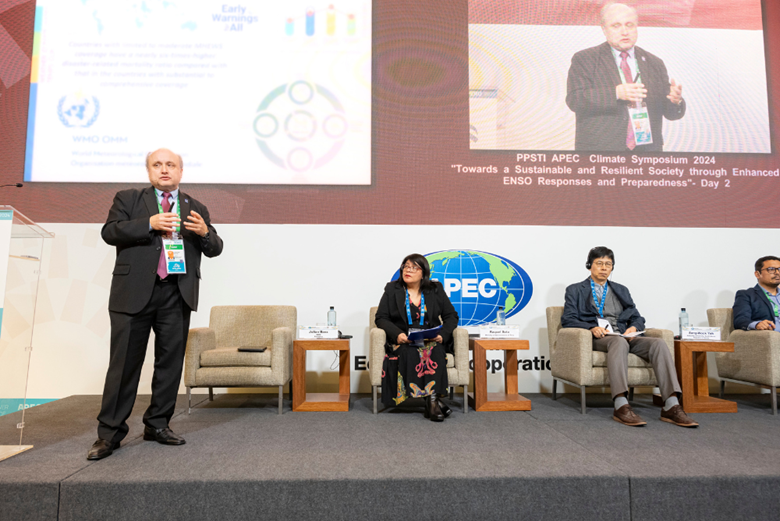Climate Challenges Call for Enhanced El-Niño Preparedness

Confronted by escalating climate change and global land and ocean warming, APEC member economies reinforced actions to enhance preparedness, improve predictive capabilities and integrate climate science into policymaking, focusing on the impacts of El Niño and La Niña events or collectively called the El-Niño Southern Oscillation.
The El Niño-Southern Oscillation (ENSO) is a recurring climate pattern involving changes in the temperature of waters in the central and eastern tropical Pacific Ocean, the ocean whose currents connects all APEC member economies. It significantly impacts global weather influencing rainfall, storm patterns and temperatures across many regions, including the Asia-Pacific.
The APEC Climate Symposium 2024 held in Lima on 12-13 August highlighted the severe impacts of ENSO on the Asia-Pacific region, where extreme weather events are increasingly disrupting economies and livelihoods.
Peru’s Vice Minister of Environment Raquel Hilianova Soto underscored the urgency of understanding and mitigating these impacts, noting that the disaster’s total damage caused by natural hazards has increased by nearly 350 percent from USD 52 billion annually in the 1980s to USD 207 billion annually in the last decade and to USD 232 billion in the first three years of the 2020s.
“We strongly believe that science will allow us to get closer to the possibility of foreseeing these phenomena and pave the ways of addressing them as soon as possible,” said Vice Minister Soto. “Knowledge, research, innovation and technology are essentials to reduce vulnerability, manage and reduce disaster risk, as well as enhance adaptation.”
“Studying these climate phenomena will save lives, as timely and accurate information allows informed decisions to be made with a high impact on the lives of our population,” Vice Minister Soto added.
In his opening remarks at the symposium, Ambassador Carlos Vasquez, 2024 Chair of APEC Senior Officials’ Meeting, reflected on the historical significance of ENSO in Peru and the broader Asia-Pacific region. "The impacts of climate change, particularly through phenomena like ENSO, are felt acutely across our economies,” he said.
“APEC has long recognized the urgency of addressing climate change and the need for a coordinated response,” Ambassador Vasquez added.
“Let us remember that the actions we take today will shape the legacy we leave for future generations,” he said. “Together, we can build a region that is not only prepared for the challenges of climate change, but one that thrives in the fights in the face of them.”
The symposium brought together diverse groups of participants with expertise in climate research, application and policymaking in order to seek cooperation to strengthen member economies’ scientific and technical capacities to combat climate change.
Presenting the latest research on predicting El Niño, Dr Shang-Ping Xie of Scripps Institution of Oceanography, University of California San Diego, highlighted how ENSO and its global influence will change in the face of global warming, adding that globally, ENSO is by far the most important predictor of climate anomalies.
“To minimize the adverse economic and social impacts of these extreme weather events, we must take immediate action to address these climate vulnerabilities, and to link them to decision-making to minimize adverse economic and social impacts,” said Do-Shick Shin, executive director of APEC Climate Center, which oversees the symposium.
"Understanding and addressing the impacts of ENSO is crucial for building climate resilience across APEC economies,” said Rahima Kandahari, Chair of APEC Policy Partnership on Science, Technology and Innovation.
“Through scientific collaboration and technological innovation, APEC remains committed to advancing this agenda, ensuring that our economies are better prepared to face the challenges posed by climate change,” Kandahari concluded.
For further details, please contact:
APEC Media at [email protected]

